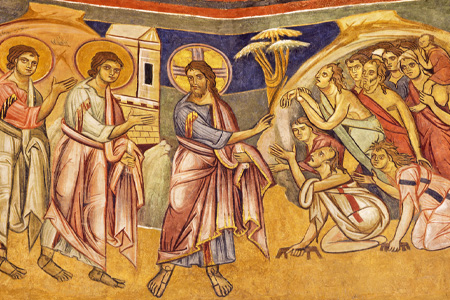On the way to Jerusalem, Jesus travelled along the border between Samaria and Galilee. As he entered one of the villages, ten lepers came to meet him. They stood some way off and called to him, ‘Jesus! Master! Take pity on us.’ When he saw them he said, ‘Go and show yourselves to the priests.’ Now as they were going away they were cleansed. Finding himself cured, one of them turned back praising God at the top of his voice and threw himself at the feet of Jesus and thanked him. The man was a Samaritan. This made Jesus say, ‘Were not all ten made clean? The other nine, where are they? It seems that no one has come back to give praise to God, except this foreigner.’ And he said to the man, ‘Stand up and go on your way. Your faith has saved you.’ (Luke 17:11-19)
Reflection - An invitation for all
A major theme in St Luke’s Gospel is that the message of Jesus is for all: men and women, rich and poor, old and young, healthy and sick, gentile and Jew. No one is excluded.
It is no accident that the one grateful leper in this week’s Gospel is not a Jew but a Samaritan – an outsider, excluded by race, religion and his illness. He joins the others in asking a Jewish Rabbi for mercy.
In curing the ten lepers, Jesus gives them back to their families, their communities, their religious practice. No longer confined to isolated places for fear of spreading disease, they are free to take up their lives again. In short, as well as healing them physically, Jesus gives them back their lives.
All ten are cured, but only one, the Samaritan, fully experiences his healing as a moment of salvation; a moment when the mercy of God has broken into his life. Jesus says that it is the Samaritan’s faith that enables him to see what the other nine do not. The man is so moved by this realisation that he turns back to Jesus breaking into shouts of joy, praising God at the top of his voice.
The Samaritan’s faith has drawn him deeper into his relationship with God who heals him and sets him free. And that is God’s great desire for each of us.
The way of Jesus (and, therefore, of his disciples) is not to exclude, but to proclaim God as the God of all by working for healing, restoration and the good of all people. And to recognise and celebrate the presence of God we read in the concrete realities of our lives.
Download to read or print our Celebrating At Home prayers, reading and reflection for this Sunday:
Celebrating At Home 28th Sunday in Ordinary Time [PDF]
Celebrating At Home 28th Sunday in Ordinary Time [ePub]















